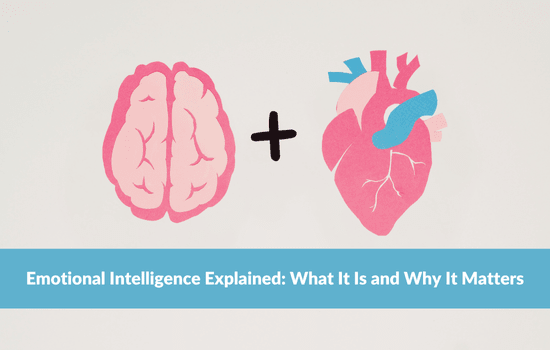Emotional intelligence (EI) isn’t just a buzzword; it’s a critical skill set that directly impacts how we lead, connect, and grow. In today’s fast-paced world, your ability to understand and manage emotions, both your own and those of others, relies heavily on self-awareness and social awareness. Developing emotional intelligence not only supports better relationships and decision-making but also fuels personal growth and emotional well-being, making it a foundational skill for long-term success.
A Beginner’s Guide to Emotional Intelligence

In this blog, we’ll explore what emotional intelligence is, why it matters more than ever, and how you can develop key traits like self-awareness and social awareness to thrive at work and in life.
What Is Emotional Intelligence?
Emotional intelligence, often referred to as “the other kind of smart,” was first defined by psychologists Peter Salovey and John D. Mayer in the 1990s as:
“The ability to perceive emotions, to access and generate emotions to assist thought, to understand emotions and emotional knowledge, and to regulate emotions to promote emotional and intellectual growth.”
It’s now widely recognized as a greater predictor of personal and professional success than IQ. In fact, many organizations invest in emotional intelligence training to improve leadership, teamwork, and communication.
Why Emotional Intelligence Matters More Than Ever
We’ve all met someone who is technically brilliant but struggles to collaborate, empathize, or adapt. Emotional intelligence fills that gap.
People with high EI are more:
-
Self-aware and grounded
-
Empathetic and socially attuned
-
Resilient and adaptable
-
Skilled in communication and conflict resolution
In my book, The Power of Emotion, I emphasize how recognizing and interpreting emotions accurately, both our own and others’, leads to stronger relationships, smarter decisions, and greater overall well-being.
The Real-World Benefits of Emotional Intelligence
Here’s why EI fuels lasting impact in all areas of life:
-
Personal Well-Being: Supports better emotional regulation, mental health, and decision-making. EI enhances resilience and self-growth.
-
Social Relationships: Social awareness helps us empathize, listen deeply, and build trust, essential for teams, families, and friendships.
-
Leadership Development: Emotionally intelligent leaders motivate effectively, navigate challenges with empathy, and build high-performing teams.
-
Conflict Resolution: By understanding emotional dynamics, we stay calm in disagreements, communicate clearly, and reach a resolution faster.
-
Adaptability: EI helps us embrace change, remain flexible, and innovate, even under pressure.
Interesting Statistics About Emotional Intelligence
-
90% of top performers have high EI
-
EI matters twice as much as technical knowledge in success
-
70% of people struggle with managing stress or conflict
-
Only 36% understand emotions as they happen
-
Just 15% of employees feel respected and valued by their employer
Can Emotional Intelligence Be Learned? Absolutely.
The best part? Emotional intelligence is not fixed. Thanks to neuroplasticity, we can build and strengthen these skills throughout life.
Ever heard the saying, “You can’t teach an old dog new tricks?”
It’s not true.
With intentional effort, you can improve your self-awareness, boost your social awareness, and become a more emotionally intelligent leader.
Ready to Grow? Let’s Build Your Emotional Intelligence
Whether you're looking to become a more effective leader, create stronger workplace relationships, or grow personally, developing your emotional intelligence is a game-changer.
✅ Join a one-day intensive Emotional Intelligence Workshop
✅ Take an Emotional Intelligence Assessment with a personalized debrief
✅ Book customized training for your team, available in person or virtually
Let’s work together to help you lead with emotional clarity, strengthen your support system, and achieve lasting success.
Emotional Intelligence Is the Edge We All Need
In a world where technical skills are no longer enough, emotional intelligence sets the truly successful apart. It’s the foundation of strong leadership, meaningful connection, and personal resilience. The good news? It’s not something you're born with; it’s something you can build.
By investing in your emotional intelligence, you’re not just enhancing your communication or leadership; you’re transforming how you show up in every area of life. At Marshall Connects, we’re here to support that journey. Whether you're looking to deepen your self-awareness, develop your team’s potential, or lead with empathy and purpose, emotional intelligence is the key, and we’re ready to help you unlock it.
This article was originally published on June 24, 2017, and has been updated (July 2025).
More Motivational Reads Here »

















